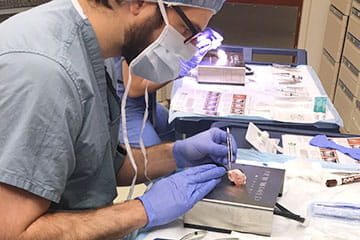Throughout the duration of the training program, residents can expect to play a primary role in approximately 500 cases.
Residents rotate through a variety of clinic settings, including the clinic at the Eugene and Marilyn Glick Eye Institute, which serves as the department’s primary academic facility for adult services as well as the location for most didactic educational activities. Other clinical settings include IU Health Methodist and University hospitals, the Sidney and Lois Eskenazi Hospital, the Richard L. Roudebush VA Medical Center, Riley Hospital for Children and the IU Health Springmill Eye Clinic.
At the VA Medical Center, residents are active and primary physicians in ophthalmology comprehensive clinics, with subspecialty supervision in medical and surgical retina. The majority of primary cataract surgeries take place on the VA rotations during the PGY-4 year.
The Sidney and Lois Eskenazi Hospital also provides a comprehensive ophthalmology experience, with weekly sub-specialty clinics in glaucoma, cornea, retina, pediatrics, oculoplastics and neuro-ophthalmology. Primary surgical cases are performed here by residents in all sub-specialties.
Residents may also have opportunities to gain experience in international ophthalmology by serving as an associate ophthalmologist with Orbis International during a one-week rotation at various sites throughout the world, when available. Residents work with Daniel Neely, MD, who serves as Orbis Cybersight’s senior medical consultant and longtime volunteer physician.
